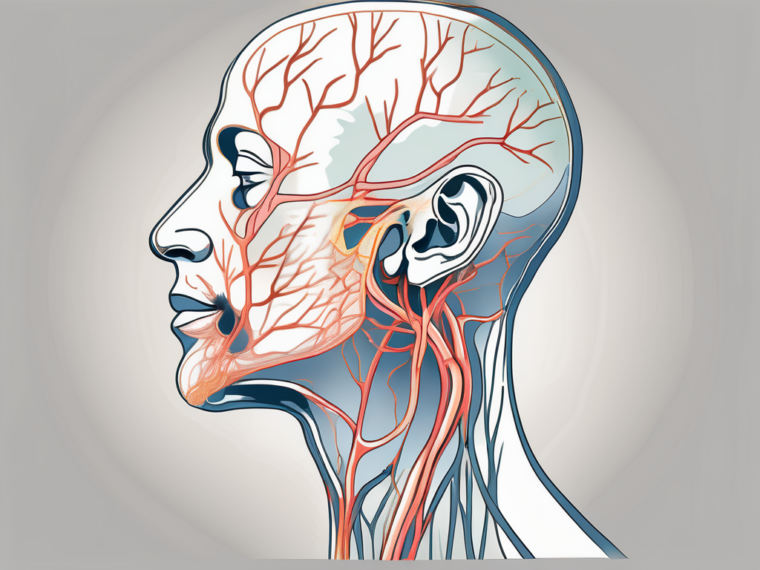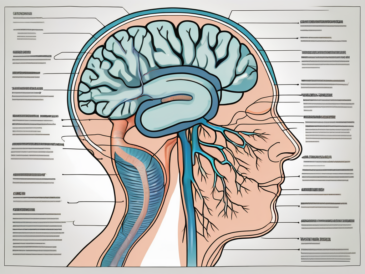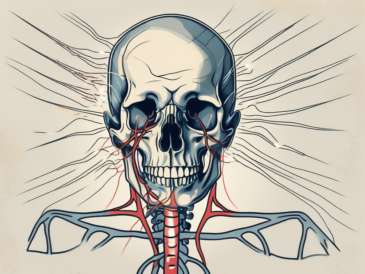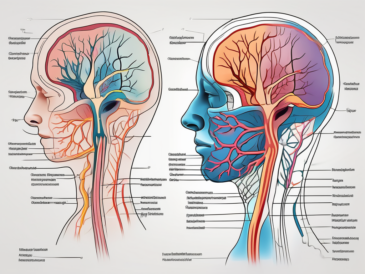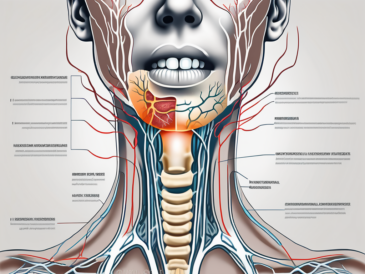The location of the glossopharyngeal nerve may not be widely known, but understanding its significance and functions is crucial for a comprehensive understanding of the human nervous system. In this article, we will delve into the intricate details of this vital nerve, exploring its definition, anatomy, role in the nervous system, and disorders related to its functioning. While it is important to be informed, it is also crucial to seek professional medical advice if you have any concerns or experience symptoms related to the glossopharyngeal nerve.
Understanding the Glossopharyngeal Nerve
The glossopharyngeal nerve, also known as cranial nerve IX, is one of the twelve cranial nerves that emerge directly from the brain. This nerve is primarily responsible for carrying sensory and motor information to and from various regions of the head, neck, and throat. It is essential for vital functions such as swallowing, taste sensation in the posterior one-third of the tongue, and the functioning of the carotid arteries, which supply blood to the brain.
Motor fibers of the glossopharyngeal nerve innervate the stylopharyngeus muscle, enabling it to assist in swallowing and speech production. Moreover, the sensory fibers of this nerve play a crucial role in transmitting information related to taste, touch, and pain from the posterior regions of the tongue, throat, and middle ear.
The glossopharyngeal nerve is a complex structure that consists of both sensory and motor components. These components work together to ensure the proper functioning of various physiological processes in the human body.
One of the key functions of the glossopharyngeal nerve is its involvement in the process of swallowing. When we eat or drink, the muscles in our throat contract in a coordinated manner to push the food or liquid down into the esophagus. The glossopharyngeal nerve plays a crucial role in this process by providing motor innervation to the stylopharyngeus muscle, which helps in the movement of the food bolus.
In addition to its role in swallowing, the glossopharyngeal nerve is also responsible for transmitting taste sensations from the posterior one-third of the tongue. This means that when we eat or drink something, the glossopharyngeal nerve carries the sensory information related to taste from the back of our tongue to the brain, allowing us to perceive different flavors.
Furthermore, the glossopharyngeal nerve is involved in the regulation of blood pressure. It carries sensory information from the carotid sinus, a specialized area in the carotid artery that helps monitor blood pressure. This information is then relayed to the brain, which can initiate appropriate responses to maintain blood pressure within normal limits.
Importance of the Glossopharyngeal Nerve in the Human Body
The glossopharyngeal nerve is a vital component of the human nervous system, and its proper functioning is essential for maintaining normal physiological processes. Dysfunction or damage to this nerve can have significant repercussions on various aspects of our health, including swallowing, taste perception, and blood pressure regulation.
While encountering issues with the glossopharyngeal nerve may be rare, it is crucial to consult with a healthcare professional if you experience any persistent symptoms related to this nerve. They can perform a thorough evaluation and provide appropriate treatment or management strategies to address any underlying concerns.
Overall, the glossopharyngeal nerve plays a critical role in our daily lives, enabling us to enjoy the taste of food, swallow without difficulty, and maintain stable blood pressure. Understanding its functions and importance can help us appreciate the complexity of the human body and the intricate interplay between various systems.
Anatomy of the Glossopharyngeal Nerve
The glossopharyngeal nerve is a cranial nerve that plays a crucial role in the innervation of the head and neck. It is one of the twelve pairs of cranial nerves that emerge directly from the brain. Amongst these cranial nerves, the glossopharyngeal nerve is unique in its functions and anatomical pathway.
Origin and Pathway of the Glossopharyngeal Nerve
The glossopharyngeal nerve originates from a collection of nerve cells located in the medulla oblongata at the base of the brain. This region, often referred to as the “brainstem,” is responsible for controlling vital functions such as breathing, heart rate, and blood pressure.
From its point of origin, the glossopharyngeal nerve exits the skull through a small opening called the jugular foramen. Situated on the sides of the skull near the base, the jugular foramen serves as a gateway for several cranial nerves, including the glossopharyngeal nerve.
Once it exits the skull, the glossopharyngeal nerve branches out into different directions, innervating various regions of the head and neck. These branches extend like intricate pathways, allowing the nerve to reach its target destinations.
Branches of the Glossopharyngeal Nerve
As the glossopharyngeal nerve travels along its pathway, it gives rise to several branches that perform specific functions. One notable branch is the tympanic nerve, which innervates the middle ear. This branch contributes to taste sensation in the posterior one-third of the tongue, making it an essential component of our ability to perceive flavors.
Another significant branch of the glossopharyngeal nerve is the carotid sinus nerve. This branch plays a crucial role in monitoring blood pressure. It contains specialized sensory receptors that detect changes in blood pressure and relay this information to the brain, allowing for appropriate adjustments to be made to maintain homeostasis.
The stylopharyngeal nerve is yet another branch of the glossopharyngeal nerve. This branch controls the stylopharyngeus muscle, which is involved in swallowing and speech. Without the proper functioning of this nerve and muscle, these essential activities would be significantly impaired.
The complex branching pattern of the glossopharyngeal nerve highlights its multifaceted role in coordinating various essential functions of our body. From taste perception to blood pressure regulation and muscle control, this nerve plays a vital role in maintaining our overall health and well-being.
Role of the Glossopharyngeal Nerve in the Nervous System
The glossopharyngeal nerve is a cranial nerve that plays a crucial role in the functioning of the head, neck, and throat region. It serves both sensory and motor functions, contributing to various important processes in the human body.
Sensory Functions of the Glossopharyngeal Nerve
One of the primary sensory functions of the glossopharyngeal nerve is carrying taste information from the posterior one-third of the tongue to the brain. This allows us to experience the rich flavors of different foods and beverages. Without the glossopharyngeal nerve, our sense of taste would be significantly diminished.
In addition to taste, the glossopharyngeal nerve provides sensation to the throat. It plays a vital role in coordinating the reflexes involved in swallowing and gagging. When we swallow, the glossopharyngeal nerve sends signals to the brain, triggering the appropriate muscular contractions that propel food and liquids down the esophagus and into the stomach.
If you notice any disturbances in taste perception or experience difficulty swallowing, it is essential to consult with a healthcare professional for a proper evaluation. They can assess the function of your glossopharyngeal nerve and determine the underlying cause of your symptoms.
Motor Functions of the Glossopharyngeal Nerve
In addition to its sensory functions, the glossopharyngeal nerve also plays a crucial role in motor coordination. Through its branch known as the stylopharyngeal nerve, it innervates the stylopharyngeus muscle.
The stylopharyngeus muscle is responsible for performing intricate movements involved in swallowing and speech production. It contracts to elevate and widen the pharynx, allowing the passage of food and liquids into the esophagus. It also assists in the production of certain speech sounds, contributing to clear and precise articulation.
The proper functioning of the motor component of the glossopharyngeal nerve is crucial for maintaining a healthy and efficient swallowing mechanism. Any abnormalities or difficulties in swallowing or speech should be promptly addressed by a qualified medical professional for an accurate diagnosis and appropriate treatment.
In conclusion, the glossopharyngeal nerve is a vital component of the nervous system, serving multiple sensory and motor functions in the head, neck, and throat region. Its sensory functions include carrying taste information and providing sensation to the throat, while its motor functions involve coordinating movements for swallowing and speech production. Understanding the role of the glossopharyngeal nerve helps us appreciate the complexity and interconnectedness of the human body.
Disorders Related to the Glossopharyngeal Nerve
The glossopharyngeal nerve is an important cranial nerve that plays a crucial role in various functions related to the throat and mouth. While disorders specifically related to the glossopharyngeal nerve are relatively uncommon, damage to this nerve can manifest as various symptoms.
Symptoms of Glossopharyngeal Nerve Damage
When the glossopharyngeal nerve is damaged, it can lead to a range of symptoms that can significantly impact an individual’s quality of life. One of the most common symptoms is persistent pain in the throat, which can be sharp, shooting, or throbbing in nature. This pain can make it difficult to eat, drink, or even speak comfortably.
In addition to throat pain, damage to the glossopharyngeal nerve can also cause difficulty swallowing, a condition known as dysphagia. This can make it challenging to eat solid foods or even swallow liquids, leading to weight loss and malnutrition if left untreated.
Another symptom of glossopharyngeal nerve damage is altered taste perception. Individuals may experience a metallic or bitter taste in their mouth, making it difficult to enjoy food or beverages. This can lead to a loss of appetite and a decreased interest in eating.
Furthermore, damage to the glossopharyngeal nerve can affect the autonomic functions of the body, such as blood pressure and heart rate regulation. Some individuals may experience fluctuations in blood pressure, leading to dizziness or lightheadedness. Changes in heart rate, such as rapid or irregular beats, can also occur.
If you experience any of these symptoms or suspect any issues with the glossopharyngeal nerve, it is essential to consult with a healthcare professional. These symptoms can potentially be caused by other underlying factors, and a proper evaluation is necessary for an accurate diagnosis and appropriate treatment.
Treatment Options for Glossopharyngeal Nerve Disorders
When it comes to treating glossopharyngeal nerve disorders, a multidisciplinary approach is often necessary. It is important to work closely with a specialist, such as a neurologist or otolaryngologist, who can provide an accurate diagnosis and formulate a treatment plan tailored to individual needs.
One of the primary goals of treatment is to manage the symptoms associated with glossopharyngeal nerve damage. Medications, such as pain relievers or anticonvulsants, may be prescribed to help alleviate throat pain and improve overall comfort. Additionally, medications that target specific symptoms, such as acid reflux or dry mouth, may also be recommended.
In some cases, physical therapy may be beneficial in improving swallowing difficulties or speech problems caused by glossopharyngeal nerve damage. A speech-language pathologist can provide exercises and techniques to strengthen the muscles involved in swallowing and improve speech clarity.
In rare cases, surgical interventions may be considered for severe glossopharyngeal nerve disorders or structural abnormalities. These procedures aim to repair or decompress the nerve, relieving the associated symptoms and restoring normal function.
Remember, it is crucial to consult with a healthcare professional to receive proper medical advice and guidance specific to your situation. They can provide a comprehensive evaluation, diagnose the underlying cause of your glossopharyngeal nerve disorder, and recommend the most appropriate treatment options to help improve your symptoms and overall well-being.
Conclusion: The Significance of the Glossopharyngeal Nerve Location
The glossopharyngeal nerve plays a crucial role in the complex network of the human nervous system. Operating both as a sensory and motor nerve, it is responsible for essential functions like taste perception, swallowing, and blood pressure regulation. While disorders specifically related to this nerve are uncommon, any persistent symptoms or concerns should be evaluated by a qualified medical professional.
The complexity of the glossopharyngeal nerve highlights the intricacies of the human body and the importance of seeking professional medical advice for any health-related concerns. By understanding the location and functions of the glossopharyngeal nerve, we can appreciate its significance in our overall well-being and ensure that appropriate care is sought when necessary.
